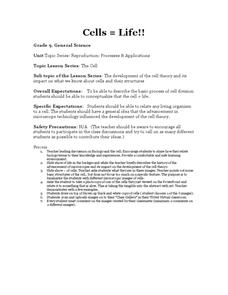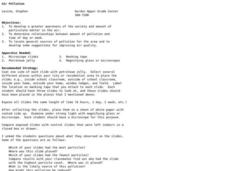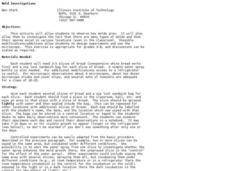Curated OER
DNA Structure and Extraction
Students see DNA as a physical building block of organisms and comprehend the basic structure of DNA and the specific components in its structure. They can explain the specific nature of base-pair matching in DNA and that DNA bases form...
Curated OER
Meiosis Review
Photos of the meiotic process and characteristics of each phase are contained in this collection of slides. The photos, however, are of low resolution and would be best viewed on a smaller screen. Have your biology learners watch this as...
Science 4 Inquiry
Plant Structures Lab Stations
In China, hibiscus is known as the shoe flower because it is used to polish shoes, while in Hawaii, it is honored as the state flower. Young scientists learn about the structure and function of flowers. They dissect hibiscus flowers,...
Curated OER
The Science of Microbes
Looking for an interesting text to share the world of microbes with your middle school classroom? The edition contains explanations, worksheets, experiments, discussions, and links to outside sources for a true and complete microbiology...
Columbus City Schools
You Can’t Sneeze On This Tissue
Take your class' understanding of cells to the next level... or levels! Demonstrate the levels of organization using a variety of engaging methods. The teacher's guide includes the materials you'll need to execute a flower dissection,...
Rice University
College Physics for AP® Courses
Take a look at an organized physics course. The 34-section electronic textbook covers material in AP® Physics 1 and 2. Teachers use the text to supplement lectures and have the class work through the labs. Each section contains multiple...
Curated OER
Cells=Life!
Ninth graders share what they know about cells. In this biology instructional activity, 9th graders study different microscopic images of the cell. They draw one and explain to their partner why they chose that image.
Curated OER
Cell Structure and Function
Students discuss scientific advances brought about by the Mars Surveyor Space Program which impact on daily life, identify laboratory apparatus like microscopes, slides and coverslips, and use the microscopes to view cells and organisms.
Curated OER
Naked to the Eye
Students understand that microorganisms are too small to see but there are other indications they exist. For this microorganisms lesson, students recognize that some microorganism are helpful and some are not. Students use a microscope...
Curated OER
Cells All Around
Students measure the size of an epithelial cell and to estimate the number of epithelial cells in a given area of the body. After watching a video on cells, student groups perform an experiment using a microscope to view some of their...
Curated OER
Human Epidermal Cells
Learners explore epidermal cells. After following specified procedures for removing epidermal cells from their wrist, students view the cells with the use of a microscope. After creating a drawing of their observation, learners label the...
Curated OER
Air Pollution
Students collect and examine particulate matter found in the air. In this pollution activity, students use microscope slides and petroleum jelly to collect particulate matter from several different locations, then use a microscope to...
Curated OER
The Gift of Life - Day 2: "Cell & Organelle Time to Tell" and "World in Color" (Chapters 2-4)
Students complete a cell biology lesson and a color lesson based on The Giver. In this biology and reading comprehension lesson set, students examine cells using microscopes. They look at the organelles and listen to How Much is a...
Curated OER
Salt: Up Close and Personal
Students predict, observe, and explain the details of salt as they view it under a variety of magnifications. They observe salt with the naked eye, and then under a hand lens, microscope, and the electron microscope.
Curated OER
Life in a Drop of Water
High schoolers examine the structure, function, and characteristics of microscopic organisms that inhabit freshwater through collection of water samples and observation through microscopes.
Curated OER
Mold Investigations
Students observe mold growth on bread. For this mold growth lesson, students place bread in various locations and in various conditions to investigate how location, moisture, temperature, and other variable impact the growth of mold on...
Curated OER
Drugged Out Daphnia
Students make predictions and investigate (using a microscope) the effects of nicotine, caffeine, aspirin, alcohol, and sleeping pills on cultures of fresh water Daphnia.
Curated OER
Plasmolysis in Elodea Plant Cells
Students microscopically observe various subcellular components. They determine the effects of different salt solutions on Elodea plant cells. They detect the presence of chloroplasts, cell walls, and cell membranes of Elodea.
Curated OER
Animal Organs and the Study of Reproduction, Embryology and Cancer
Students examine organs from dogs and cats to study reproduction, embryology, and the identification of cancer. They record their observations at both the gross and microscopic levels. They present their information to the class.
Curated OER
Inquiry in Science Using an Animal Behavior Model
Students observe a planaria without a microscope and with a stereoscopic microscope. They draw the planaria and describe its motion and eating habits. Students research planarias various body systems and behavior. They design an...
Curated OER
Comparing Plant and Animal Cells
In this comparing plant and animal cell worksheet, students use a microscope to observe cheek cells and onion cells. They compare their observations and answer 3 questions about their discoveries.
Curated OER
Pond Life
Students explore pond ecosystems. In this living environment lesson, students observe the local pond and identify the living things they find by drawing pictures. Students observe organisms that were found in the pond by using a...
Curated OER
MITOSIS
Tenth graders examine the process of mitosis on a laser disc. They examine mitosis in an onion utilizing the microscope.
Curated OER
Infection Wars
Students explore how our bodies fight infection. Using a microscope, they observe red blood cells, white blood cells and different bacteria under a microscope.
Other popular searches
- Parts of a Microscope
- Compound Microscopes
- Label Compound Microscope
- Dissection Microscopes
- Microscope Cheek Cells
- Digital Microscope
- Microscope Lab
- Biology Lab Microscopes
- Scanning Electron Microscopes
- Cheek Cells and Microscopes
- Lesson Plan on Microscopes
- Lenses and Microscopes

























